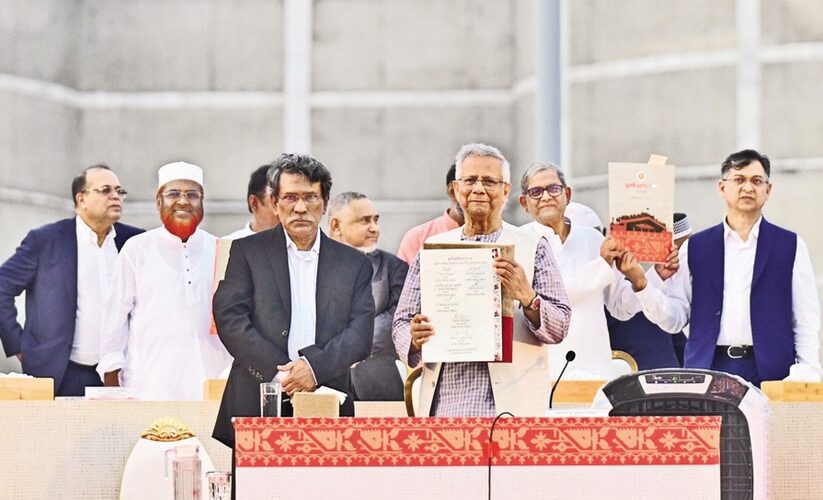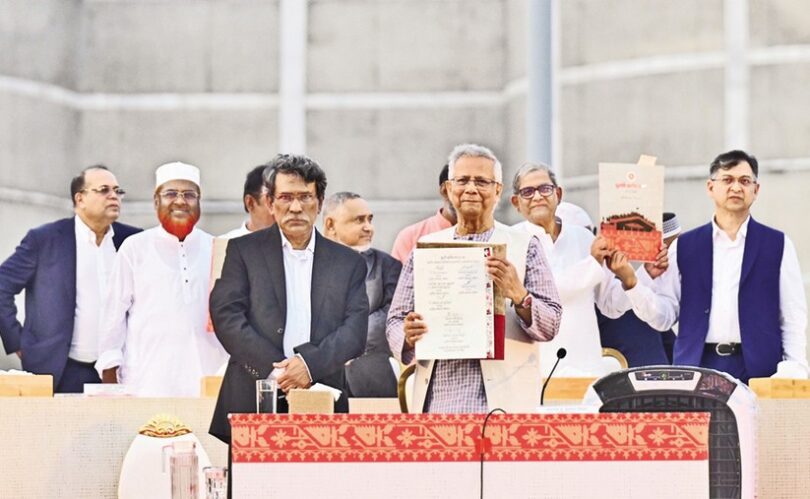On October 17, 2025, 25 political parties in Bangladesh signed the “July National Charter” at a ceremony overseen by Muhammad Yunus, Chief Advisor to the Interim Government of Bangladesh. The charter conforms to demands raised in the July 2024 mass uprising leading to the regime change. It includes constitutional and legal changes, strengthening accountability and transparency, electoral reforms, legal protection to families killed in the uprising, and constitutional changes through referendum. The suspended Sheikh Hasina-led Awami League was excluded from the process. The National Citizen Party (NCP), Communist Party of Bangladesh (CPB), Socialist Party of Bangladesh (BaSaD) and Bangladesh Jasad boycotted the ceremony.
Clashes broke out outside the Parliament building during the signing ceremony, with police using tear gas. Some relatives of those killed in the uprising, voiced anger that their concerns were not included in the charter. The NCP, constituted by student leaders of the uprising, wants a formal government directive for the Charter. The party also raised serious concerns about the impartiality of the Election Commission (EC), calling for its reconstitution before national elections, during a meeting with Muhammad Yunus. The party demands a clear timeline for justice to the families of martyrs/injured in the uprising, warning that without broader institutional reform, the electoral process would not be credible.

The Bangladesh International Crimes Tribunal (ICT) has sent 15 serving or former army officers (of Major General, Brigadier General, Colonel, Lieutenant Colonel and Major rank) to jail for their alleged roles in enforced disappearances and atrocities in the 2024 mass uprising under the Sheikh Hasina government. The officers were taken into custody after the ICT issued arrest warrants on October 8. This is being seen as a move by Muhammad Yuns for his own political benefit and to pressurize Army Chief General Waker-uz-Zaman, especially since no such action has been taken against the police/armed police forces of Bangladesh. Following a meeting between Yunus and Zaman, the accused officers were shifted to the sub-jail after they were produced before the ICT judges. Waker-uz-Zaman is scheduled to complete his tenure in June 2026, when he turns 60.
The Indian Army hosted the UNTCC (UN Troop Contributing Countries) Chiefs’ Conclave 2025 from 14-16 October 2025 in New Delhi with a shared commitment to strengthen UN Peacekeeping. The Conclave brought together UNTCC Chiefs from 32 nations, senior UN officials, policymakers and industry leaders. General Waker-uz-Zaman did not attend the conclave; which could have been embarrassing since he is married to a daughter of Sheikh Hasina’s cousin-brother. However, the Indian Army Chief met veteran Lt, Gen. Md Maniur Rahman of Bangladesh Army (former head of Army’s Training and Doctrine Command) on the sidelines of the UNTCC. The Indian both China and the Army posted on X: “On the sidelines of UNTCC 2025, General Upendra Dwivedi, COAS, held a constructive and productive discussion with Lt. Gen. Md Maniur Rehman, Bangladesh Army. The leaders reaffirmed their commitment in strengthening defence cooperation, training and coordination in UN peacekeeping.”
Yunus, who was brought to power through a CIA-orchestrated regime change in Bangladesh, remains loyal to the US and China. With his eye on the minerals in Myanmar, US President Donald Trump is going soft on sanctions against the military junta. Trump wants a naval base in Bangladesh (St Martin’s Island) though the US is terming it as an initiative, under the “Quad Ports’ program to counterbalance China's influence in the Bay of Bengal. An initial meeting to discuss this project between the US and Bangladesh officials was held in Dhaka during September 2025. Earlier on August 31, a 50-year-old US Special Forces officer, Terrence Arvelle Jackson was found dead in Westin Hotel, Dhaka under mysterious circumstances. According to Dhaka Police, he had travelled to different parts of the country on “work related to his government”. Jackson was reportedly involved in imparting military training to Bangladeshi Army officers at undisclosed locations for at least four months before his death.
On March 20, 2023, the submarine base (BNS ‘Sheikh Hasina’) was inaugurated in Bangladesh by then-Prime Minister Sheikh Hasina. Built with financial and technical assistance from China at a cost of $1.21 billion, it can dock six submarines and eight warships simultaneously. Bangladesh is now reportedly offering China the World War II-era Lalmonirhat Air Base proximate to India’s Siliguri Corridor, where Bangladesh has commenced construction of hangars. Concurrently, Japan is constructing a deep-sea port at Matarbari in Bangladesh. The project is jointly financed by the Japan International Cooperation Agency (JICA) and the Chittagong Port Authority; with the first phase expected to be operational by 2027–2029, and full completion planned by 2041.
A three-member team from India’s military intelligence, led by Major General KK Singh, visited Dhaka on October 14-17 and interacted with Bangladesh army officers. On October 16, General Waker-uz-Zaman, with a retinue of Bangladesh army officers, Gen Zaman and a retinue of subordinate colleagues from the Bangladesh Army flew in three helicopters to inspect the two World War II-era airstrips at Lalmonirhat and Thakurgaon in two districts adjoining the Bangladesh-India border. According to reports, Bangladesh is giving the contract for reactivation of Lalmonirhat airbase to a Pakistani construction company, for eventual use by the Chinese PLA. Bangladesh is apparently planning to activate the Thakurgaon airstrip on the same lines as Lalmonirhat.
China and Pakistan have been regularly supplying arms, ammunition and explosives to Bangladesh. China has also supplied fighter jets and missiles to Bangladesh. A high-level military delegation from Bangladesh recently visited China to discuss procuring more advanced drones (like China’s CH-4) and anti-drone technology. A recent visit to a prominent Chinese drone manufacturer by Bangladesh's army chief General Zaman underscores the deepening cooperation.
Now Bangladesh is in the process of signing a deal with Turkey for importing air defence systems, as well as co-production of Turkish combat drones in Bangladesh. The Turkish air defence package is a combination of the medium-range Hisar-O+ and the long-range Siper missiles. The deal, in the final negotiations phase, is believed to include not only missile systems but also radar, command, and control infrastructure, as well as training and maintenance packages essential for long-term operational sustainability. The first Hisar-O+ batteries could arrive as early as late 2026, followed by Siper systems for Bangladesh’s Air Force by 2027 or 2028.
In October 2025, Bangladesh air force chief ACM Hasan Mahmood Khan made a high-profile visit to Turkey, where he toured Turkish Aerospace Industries (TAI), Aselsan, and Roketsan. During the visit, Khan discussed multiple acquisition programs, including Baykar’s Bayraktar TB2 and Akinci drones, in addition to the Hisar and Siper systems. Turkey’s Defence Industries Agency (SSB) finalized a $1.5 billion contract for Hisar-O+ mass production in 2023. The Siper system began entering Turkish service in 2024 after a decade of development and testing. Its engagement envelope exceeds 100-km range and 20-km in altitude. Turkey is already supplying weapon systems to Pakistan and its entry in Bangladesh will give it a foothold in the Bay of Bengal. The Turkey-Pakistan-Bangladesh cooperation represents a hardcore Islamist anti-India troika.
In December 2024, the Arakan Army (AA) gained full control of Myanmar's 270-km border with Bangladesh and captured the Maungdaw Township and the Border Guard Police Battalion Number 5 after months of intense fighting. Border skirmishes have been happening but America’s plan for Bangladesh to establish a logistics corridor to assist the AA fight Myanmar’s military junta didn’t work and is off the agenda now with Trump eyeing Myanmar’s minerals. Repatriation of Rohingya refugees from Bangladesh to Myanmar isn’t possible with the situation in Myanmar.
A senior official from Myanmar's military government attended the October 2024 ASEAN Summit in Laos for the first time in three years. The focus of the 2025 ASEAN Summit in Malaysia commencing tomorrow will be on Thailand-Cambodia with Trump vowing to oversee the signing of a formal agreement for lasting peace between the two, to add another to the so-called 8-9 ceasefires he claims. But what can the Summit deliver for Myanmar? Malaysia had said that the priority in Myanmar should be ending violence and finding peace, rather than holding elections in December 2025. Will ASEAN send observers to monitor the elections in Myanmar? Peace in Myanmar in the near future is unlikely with the infighting and powerplay of multiple external powers. The AA recently carried out drone attacks on the NSCN positions in Myanmar.
The author is an Indian Army veteran. Views expressed are personal.
More on Bangladesh:
Unfinished Agenda of Mohd Yunus: https://www.thestrategicperspective.org/unfinished-agenda-of-mohd-yunus/
Pakistan, Bangladesh and Sri Lanka Stock Exchanges unite: https://www.thestrategicperspective.org/pakistan-bangladesh-and-sri-lanka-stock-exchanges-unite/
Whither Bangladesh: https://www.thestrategicperspective.org/whither-bangladesh/
Bad Vibes from Bangladesh and Bhutan: https://www.thestrategicperspective.org/bad-vibes-from-bangladesh-and-bhutan/
China’s Northeast Focus: https://www.thestrategicperspective.org/chinas-northeast-focus/










